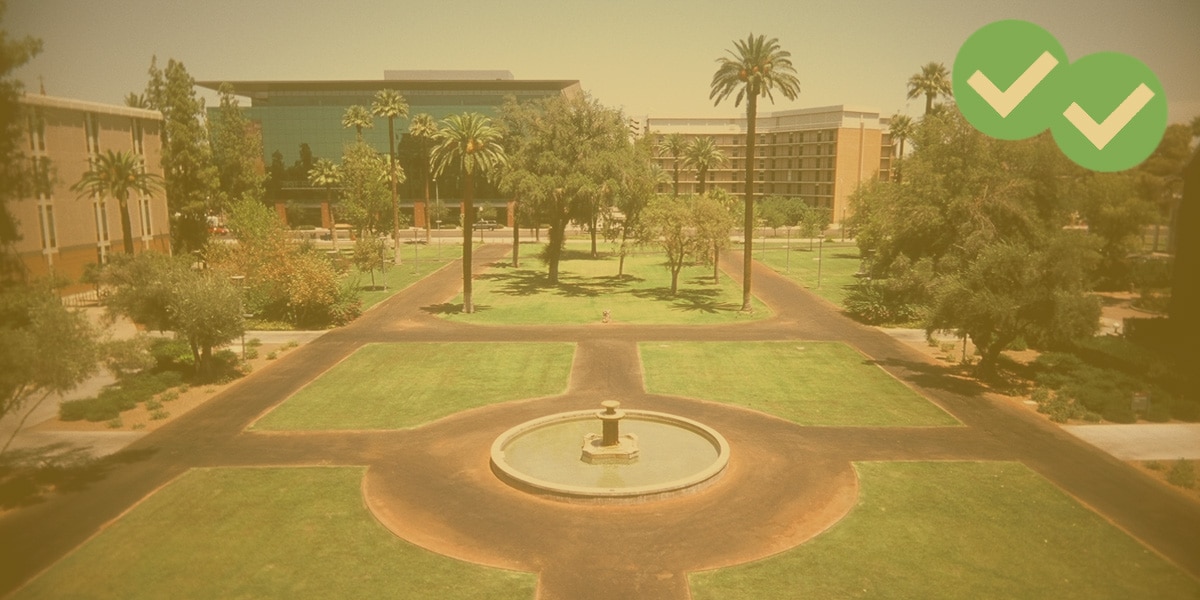
Arizona State University is an excellent choice for your studies. But what are the ASU SAT scores, ASU ACT scores, and ASU GPA you need? Read on to find out all about ASU admissions and how to get into ASU.
How to Get Into ASU: The Basics
Before we look at the basic statistics for ASU admissions and how to get into ASU, let’s look at the basics of ASU itself. Arizona State University is a large public university in the Phoenix, Arizona metro area. According to US News and World Report’s rankings, ASU is number 103 among national universities in the US. This puts ASU in the top 10% of schools. And ASU is ranked number 1 for innovation by USN&WP, certainly an impressive feat!
The main ASU campus is in Tempe, Arizona. There are also four other campuses, which you can see on this page from ASU’s official website. Certain majors and schools within ASU have their own admissions requirements. But for the most part, the admissions expectations at Tempe are also admissions expectations of the satellite ASU campuses. (In other words, how to get into ASU-Tempe is the same as how to get into ASU.) Below is a list of the general standards for ASU SAT scores, ASU ACT scores, ASU GPA, and the acceptance rate at ASU.
| ARIZONA STATE UNIVERSITY ADMISSIONS | ASU SAT Scores | ASU ACT Scores | ASU GPA | ASU Acceptance Rate |
|---|---|---|---|---|
| Requirements for in-state students | 1120 (minimum) |
22 (minimum) |
3.0 (unweighted minimum) |
86% (out-of-state and in-state combined) |
| Requirements for out-of-state students | 1180 (minimum) | 24 (minimum) |
3.0 (unweighted minimum) |
86% (out-of-state and in-state combined) |
| Average scores (all applicants) | 1237 | 25 | 3.5 | 86% (out-of-state and in-state combined) |
(Sources: US News and World Report, ASU Admissions Requirements)
Again though, this is only the most basic information. And beneath the simple sets of numbers in the table, the real status of ASU admissions criteria could best be described as “it’s complicated.”
ASU admissions are trickier than you might first think. This is because ASU also looks at exam subscores and section scores to measure competency. ASU has certain competency rules for GPA as well. What do these rules mean? In the next few sections of this article, I’ll tell you exactly how “competency” works in ASU admissions, as it relates to ASU SAT scores, ASU ACT scores and ASU GPA. (You can also check out ASU admissions’ official competencies web page for undergraduate applicants.)
How to Get Into ASU: ASU SAT Scores and Competency
Arizona State University requires students to demonstrate a certain minimum level of competency in a range of academic skills. One way to demonstrate this competency is by SAT scores. To demonstrate English competency, ASU applicants can have a minimum subscore of 580 in SAT Reading & Writing or a 21 on ACT English.
Then there’s science competency. That’s where ASU SAT scores get downright tricky! You see, ASU wants its applicants to demonstrate science competency, but the SAT doesn’t have a science section. If you’re going to demonstrate your competency through test scores, (and that’s just one option!) ASU wants to see minimum test scores in at least three different standardized tests for science, covering three different subject areas. In other words, you’ll need to meet three out of the following four requirements:
- SAT II Subject Test in Chemistry: 600
- SAT II Subject Test in Biology: 590
- SAT II Subject Test in Physics: 620
- ACT Science section (part of the whole ACT exam): 20
As you can see from the list above, if you don’t take the ACT and you want to use test scores to demonstrate your science competency, you need to have taken all three of the SAT Subject Tests. Note that as of 2021, the College Board is no longer offering these exams. However, if you have previously taken them, you can still submit scores, according to the ASU website.
Other ways of showing science competency include taking three high-school or college-level laboratory science courses.
What about competency on the ACT, you may ask? Well, hypothetical reader who’s decided to take the ACT instead of the SAT, the answers to that question are in the very next section.
ASU Admissions, ASU ACT Scores, and Competency
ACT scores for competency are exactly the same for students who apply inside and outside of Arizona. (Like the SAT competency scores mentioned above.)
ASU will feel confident in your English competence if you have a score of at least 21 in ACT English. And then, for math competence, the magic number (well, magic minimum is a 24 on the ACT Math section. Last but not least, let’s talk science competence. As outlined in the list of science competence standards in the SAT section immediately above this ACT section, applicants may use a 20 in the Science section of their ACT as one way to prove science competency, and may also use the SAT Subject Tests in Chemistry, Biology, or Physics as other possible ways to demonstrate competency.
How to Get into ASU: Having the Right Competency in Your ASU GPA
As I already mentioned, you need a GPA of 3.0 to get into ASU. Or… do you? Remember when I told you that ASU admissions was complicated? ASU GPA is where most of that complexity lies.
So we’ve already discussed the SAT or ACT requirements you can use to convince ASU you that you are a very competent student. But what if I told you that it’s possible to not have those minimum SAT or ACT scores, yet still get into ASU? Then, what if I told you that in spite of ASU’s GPA requirement, it’s actually possible to be accepted with less than a 3.0 GPA in your English or Math classes, and in a few other select groups of classes? It’s all true!
To get your SAT or ACT competency requirements waived, you simply need to demonstrate competence with your high school grades instead. And while you do need a cumulative 3.0 GPA for your classes as a whole, ASU’s competency rules require you to only have a 2.0 in the specific high school classes that demonstrate competency.
So, what on earth are ASU’s required competency classes? Don’t worry, I’m getting to that. 🙂
To demonstrate competency and be eligible for ASU admissions, you need to complete the following high school coursework, with a 2.0 GPA in each required set of classes:
- English Competency
Four years of high school English, with a focus on composition and literature - Mathematics Competency
Four years of high school math, as follows: geometry, algebra I, algebra II, and one advanced math class that has algebra II as a prerequisite - Laboratory Science Competency
Three years of high school lab science classes, covering any three of the following: biology, chemistry, earth science, or physics - Social Science Competency
One year of high school American history and one year of high school social science - Foreign Language Competency
Two years of the same foreign language in high school - Fine Arts or Career/Technical Education Competency
One year of high school fine arts classes or high school career/technical classes
So you only need a 2.0 in any one of the individual competencies above. And there’s still more good news. With the exception of math and laboratory science, it’s possible to get a GPA of below 2.0 in a competency and still be considered for admission. But be careful! If you are using GPA to demonstrate competency rather than test scores, ASU only allows you to have two competencies that fall below that 2.0 GPA. If you have less than a 2.0 in more than two groups of your competency classes, you aren’t eligible for admission.
ASU Freshman Profile

So we’ve gone through the requirements on how to get into ASU, in depth. But requirements aside, what is the typical freshman’s test scores and GPA? And what else is generally true of first year ASU students?
Let’s look at testing and grades first. Although the minimum GPA requirement for ASU is 3.0, the average GPA of accepted freshmen is 3.5. Freshmen also significantly top the minimum test score requirements. The average first year undergrad is accepted into ASU with a 1237 on the SAT. This is higher than the in-state requirement of 1120, and higher than the 1180 minimum ASU sets for out-of-state students. Average ACT scores are similarly good. Freshman who get accepted and enrol have an average of 25 on the ACT; this is above the 22/24 requirements for in-state/out-of-state applicants.
That should give you an idea of where you stand among other incoming ASU students. But what will your future ASU classmates be like as people? What do ASU freshman study? What background do they come from? Where do they live? Hold tight, because I have answers to all of those questions!
In most recent academic years (including the 2020-2021 school year), nearly half of all incoming freshmen have majored in just two fields: engineering and business. But many other majors are well-represented on campus. For more info on this, check out ASU’s official breakdown of freshmen fields of study.
Now, let’s get a little more personal and look at economic background. It’s clear that ASU has relatively few really rich students in their freshman classes. How can I know this? Well, according to the US News and World Report, 58% of incoming freshmen are eligible for needs-based college loans and grants.
From other US News and World Report data, we can also see that ASU students ultimately become engaged in the larger Phoenix community surrounding the campus. A full 73% of all ASU students live off campus, with only 27% living on campus. With that in mind, you’re still guaranteed to get an on-campus living experience at the beginning of your ASU academic career. According to the official ASU Housing website, first year students are required to live on campus.
If this freshman profile doesn’t sound exactly like you, don’t worry. As a national university, ASU loves to see diversity in its students. They’re always looking for students who meet their standards of academic excellence, yet bring more variety to their academic community.
ASU Admissions: Other Requirements, and More Info about How to Get Into ASU
When considering your chances with ASU, you should also think about your class rank. As you can see in ASU’s official average class rank statistics, ASU is much more likely to accept students that were in the top 25% of their class in high school.
If you aren’t in the top 25% but still really want to go to ASU, though, don’t despair. For one thing, it’s not a hard and fast rule, as you can see in the table I linked in the previous paragraph. For another thing, if your high school doesn’t disclose class rank, you’re exempt from the requirement. (Some small high schools, especially private ones, don’t give class rank data to universities.)
And even if you do have a class rank that doesn’t meet ASU’s standards, you may still be able to get into ASU… just not as a first year student. Transferring in from a community college is a popular option for many ASU hopefuls. This could be an option if your grades, test scores, or class rank are below standards. If transferring to ASU sounds like it might be for you, see the ASU transfer student web page for more details.
And of course, if you’re an international student, you’ll need to take an English proficiency test, either the IELTS, the TOEFL, or the PTE. You may or may not need to meet the same competency and testing requirements as domestic students; see ASU’s international requirements page for more info.
FAQ: ASU Admissions, ASU SAT Scores, ASU ACT Scores, and How to Get Into ASU
What are the ASU SAT scores, ASU ACT scores, or ASU GPA required for scholarships?
That’s a very good question, but a far-from-simple question. The truth is that ASU scholarship requirements can vary a lot. Fortunately, there are two excellent online sources of information about ASU scholarships on the web. The College Board Big Future Scholarship Search website can help you look for ASU scholarships, and find out what SAT or ACT requirements the scholarships have, if any. (You can also search for scholarships at countless other schools!) And of course, ASU itself has its own online scholarship guide.
Does ASU require a letter of recommendation?
For general undergraduate studies, the answer is “no.” Not only does ASU not require letters of recommendation for general undergraduate applicants, they also will not even consider letters of recommendation in their admissions decisions.
However, ASU’s Barrett Honors program does require two letters of recommendation. If you’re hoping to get into ASU Barrett, or if you’re applying to additional schools that want recommendations, you may want to consult Magoosh’s guide on how to ask for a letter of recommendation for college.
Does ASU require an application essay?
Again, the answer is no for general application, but yes for the Barrett Honors College. Barrett has its own essay advice on its website. For additional tips on admissions essays, see Magoosh’s guide to the Common App essay (also applicable to other types of admissions essays).
How Can I Calculate my GPA?
Your high school will likely tell you your running GPA on your report card. But you don’t have to wait for your report card to come out to calculate your current GPA. Instead, you can convert your current letter grades into the 0-4.0 GPA scale. Magoosh has a tool to help you do this, so check out our article “How to Calculate Your GPA (Bonus GPA Calculator Worksheet).”
Have additional questions? Amelia Harrar, ASU Admissions Counselor, might be able to help out!

How to Get into ASU: The Takeaway
ASU is the best of both worlds in many ways. It’s a high-ranking national university with some excellent programs. But at the same time, the standards ASU SAT scores, ASU ACT Scores, ASU GPA, etc… are relatively easy to meet. ASU’s 85% acceptance rate indicates you just might have a good chance of getting in.








Leave a Reply